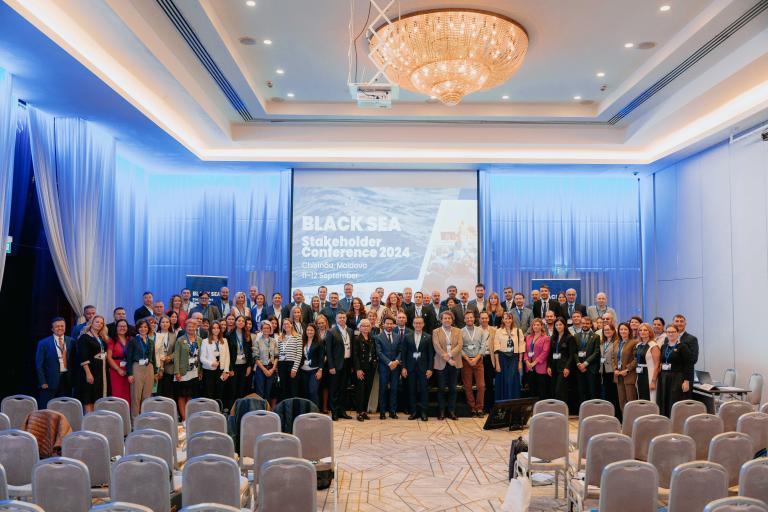The Common Maritime Agenda (CMA) stakeholder conference 2024 edition took place on 11 September, in Chișinău, under the auspices of the CMA Moldovan Coordinator, alongside the European Commission and with the support of the Black Sea Assistance Mechanism.
This two-day annual landmark event served as a meeting point for more than 100 participants, experts and practitioners, from 17 countries and from diverse backgrounds, including EU institutions, blue economy experts, Non-Governmental Organisations, research institutions, national authorities, and industry. Attendees engaged in cross-sectoral discussions on cooperation, the importance of marine research, sustainability and pollution, energy, innovation, and blue economy skills.
The conference opened with welcoming remarks from the Moldovan authorities, the European Commission, and the European External Action Service, emphasising the importance and value of regional cooperation for a sustainable blue economy in the Black Sea. Three insightful panel discussions enriched the day’s proceedings. Expert panellists covered three key topics: marine scientific knowledge for the Black Sea blue economy, challenges and opportunities on the Black Sea’s path to sustainability and zero pollution, and innovative perspectives for the Black Sea’s blue economy community. Each presented the latest updates on results and outputs of their activities, offering insights into how these are tackling pressing issues in the Black Sea basin, while upholding efforts to achieve the CMA goals. The panel discussions highlighted technological advancements, project sustainability efforts, novel ways of tackling pollution or produce food, as well as investment. The panellists also responded to questions posed by the audience, drawing the conversation towards scaling up solutions, transferring project results into other industry sectors, addressing climate change concerns and enhanced synergies among projects and other activities.
In the afternoon, three parallel co-creation workshops offered a platform for participants to identify key priorities and challenges on a series of topics with a view to brainstorming potential solutions on:
decarbonisation and energy transition of the Black Sea maritime and riverine transports and ports,
blue economy skills and ocean literacy for existing and emerging Black Sea jobs,
and Black Sea ecosystem conservation, plastic pollution management and circularity opportunities in a land-sea perspective.
On the sides of the conference, participants could enjoy an exhibition of emblematic projects and initiatives from the region fostering the development a sustainable blue economy under the CMA, mostly supported under EU funds and instruments. The conference closed with the traditional Black Sea Project Awards honouring outstanding initiatives in line with the main CMA goals:
Recycllux and the Ballast Water Treatment Service received the award in the Healthy marine and coastal ecosystems category.
DOORS Black Sea project and Black Sea CONNECT received the award in the Competitive, innovative, and sustainable blue economy category.
The Black Sea Accelerator (by DOORS Black Sea and BRIDGE Black Sea) received an honourable mention for Fostering Investment in the Black Sea blue economy category.
Participants had the opportunity to choose the “winner of the winners” after listening to these initiatives and voting, awarding the title to Black Sea CONNECT. You can find more about the project here: http://connect2blacksea.org/about-the-csa/
On 12 September, two parallel meetings complementing the Black Sea Annual Stakeholder Conference took place. A technical group meeting was held on the Sustainable Aquaculture (SustAqua), where experts discussed policy recommendation, research topics, and potential project proposals. In parallel, a Steering Group meeting was held, with representatives from each country participating in the CMA (Bulgaria, Georgia, Moldova, Romania, Türkiye, Ukraine)as well as the Directorate-General for Maritime Affairs and Fisheries (DG MARE), the Directorate-General Regional and Urban Policy (DG REGIO), the Directorate-General European Neighbourhood and Enlargement Negotiations (DG NEAR) of the European Commission, and the European External Action Service. Besides updating on respective blue economy national developments, members discussed among others closer synergies with the two other EU sea basin strategies, in the Atlantic and Wester Mediterranean, and the potential activation of a new Technical Group in 2025 on sustainable tourism. Observes to the CMA were also present, including the World Bank, the Black Sea Economic Cooperation (BSEC), the Black Sea Commission, the Interreg NEXT Black Sea Programme, and the Conference for Peripheral Maritime Regions (CPMR), reporting on past and future activities in the region by their respective organisations.
The successful organisation of this year’s stakeholder conference by the Moldovan coordinator highlights the collective efforts to advance the initiative, acknowledging exceptional projects and activities for spurring innovation, enhanced regional cooperation, increased investment, and sustainability initiatives.
The complete report of the event is now published on our website.
More information on the two meetings held on the second day will be shared soon, so keep an eye out to the CMA newsfeed and social media.
Find the Steering Group meeting article here.
Find the Technical Group meeting article here.
To learn more about projects around the Black Sea, you can take a look at the project posters presented during the side exhibition at the conference.

